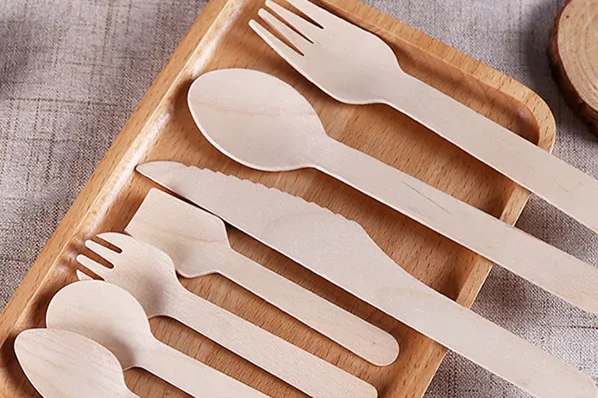Wooden tableware has a timeless appeal, evoking a sense of rustic charm and natural beauty. Beyond its aesthetic appeal, wooden tableware offers a range of advantages that make it a preferred choice for both everyday use and special occasions. Let's explore the benefits of wooden tableware and why it continues to be a popular option for discerning consumers.
First and foremost, wooden tableware is renowned for its eco-friendliness and sustainability. Unlike disposable plastic utensils or fragile ceramic dishes, wooden tableware is biodegradable and renewable, making it a more environmentally responsible choice. By opting for wooden tableware, consumers can reduce their reliance on non-biodegradable materials and minimize their ecological footprint.
Moreover, wooden tableware is durable and long-lasting, capable of withstanding the demands of daily use. Unlike plastic or ceramic alternatives that may chip, crack, or break over time, wooden utensils and dishes are resilient and resistant to damage. This durability ensures that wooden tableware can withstand the rigors of everyday meals and remain in excellent condition for years to come.
In addition to durability, wooden tableware is lightweight and easy to handle, making it suitable for individuals of all ages. The smooth, polished surfaces of wooden utensils provide a comfortable grip, enhancing the dining experience for both adults and children. This ease of use is particularly beneficial for families with young children or elderly individuals who may have difficulty handling heavier tableware.
Furthermore, wooden tableware is naturally heat-resistant, making it safe for use with hot foods and beverages. Unlike metal utensils that may become uncomfortably hot to the touch, wooden utensils remain cool and comfortable, even when used to stir or serve piping hot dishes. This heat resistance also makes wooden tableware suitable for cooking and serving a variety of dishes, from soups and stews to pasta and rice dishes.
Another advantage of wooden tableware is its versatility and aesthetic appeal. Available in a variety of shapes, sizes, and finishes, wooden utensils and dishes can complement a wide range of dining styles and décor themes. Whether you prefer a rustic farmhouse look or a sleek modern aesthetic, there's a wooden tableware set to suit your taste and style preferences.
Moreover, wooden tableware is easy to clean and maintain, requiring minimal effort to keep it looking its best. Unlike porous materials like plastic or ceramic, wooden surfaces are naturally resistant to stains and odors, making them easy to wipe clean with mild soap and water. Periodic oiling or waxing can help maintain the luster of wooden tableware and protect it from drying out or cracking over time.
Additionally, wooden tableware is non-reactive, meaning it won't impart any unwanted flavors or chemicals to your food. Unlike metal utensils that may react with acidic or alkaline ingredients, wooden utensils provide a neutral and safe option for food preparation and serving. This non-reactivity ensures that the natural flavors and aromas of your dishes remain intact, enhancing the overall dining experience.
In summary, wooden tableware offers a host of advantages that make it an attractive choice for consumers seeking sustainability, durability, and aesthetic appeal. From its eco-friendliness and heat resistance to its versatility and ease of maintenance, wooden tableware ticks all the boxes for both practicality and style. Whether used for everyday meals or special occasions, wooden tableware adds a touch of natural beauty and warmth to any dining table, making every meal a memorable experience.

 EN
EN
 FR
FR
 JA
JA
 RU
RU
 ES
ES
 AR
AR
 BG
BG
 CS
CS
 DA
DA
 NL
NL
 FI
FI
 DE
DE
 EL
EL
 HI
HI
 IT
IT
 KO
KO
 NO
NO
 PL
PL
 PT
PT
 RO
RO
 SV
SV
 TL
TL
 ID
ID
 LT
LT
 SR
SR
 UK
UK
 VI
VI
 HU
HU
 TH
TH
 TR
TR
 FA
FA
 AF
AF
 MS
MS
 GA
GA
 EU
EU
 LA
LA
 NE
NE
 KK
KK
 UZ
UZ

